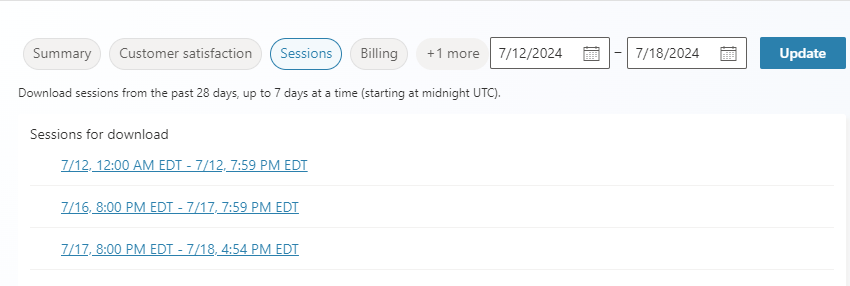Analyze session information in Copilot Studio
By default, you can download up to seven days of copilot conversation transcripts from the past 30 days directly from the Copilot Studio portal.
You can also download and view conversation transcripts from the Power Apps portal. For more information, see Understand conversation transcripts from Power Apps.
Prerequisites
- To view session transcripts, one needs to have the transcript viewer security role. Only admins can grant this role by assigning the Transcript viewer security role during copilot sharing.
Download copilot session transcripts
Open the desired copilot.
On the top menu bar, select Analytics.
Select the Sessions tab.
Note
Sessions are split into rows representing 1-day increments with up to 50 thousand sessions each.
For chatbots created in Teams and classic chatbots, if the specified date range includes a date that falls within the last 24 hours, the sessions are represented by a single row with up to 2,500 sessions. Otherwise, sessions are split into rows that represent 1-day increments with up to 2,500 sessions each.
Select a row to download the session transcripts for the specified time frame.

The download starts immediately. The file is saved to your browser's default download location.
Work with session transcripts
A session transcript file is a comma-separated values (CSV) file that contains the following information:
SessionID: A unique identifier per session.
StartDateTime: Time at which the session started. Entries are sorted by this column in descending order.
InitialUserMessage: First message typed by the user.
TopicName: Name of the last authored topic that was triggered in this session.
ChatTranscript: Transcript of the session in the following format: "User says: <UserInput>; Bot says: <CopilotResponse>;".
- Conversation turns are separated by semicolons.
- <CopilotResponse> doesn't include the options presented to the user.
Example:
User says: store hours; Bot says: Which store are you asking about?; User says: Bellevue; Bot says: Bellevue store is open from 10am to 7pm every day.;SessionOutcome: Outcome of the session (Resolved, Escalated, Abandoned, Unengaged).
TopicId: A unique identifier of the last authored topic triggered in this session.